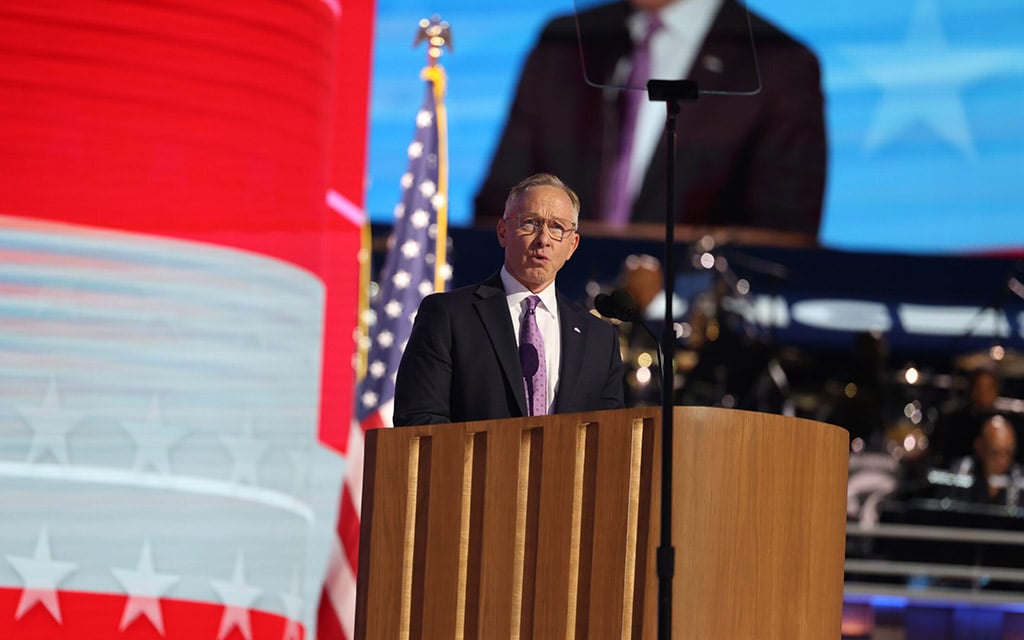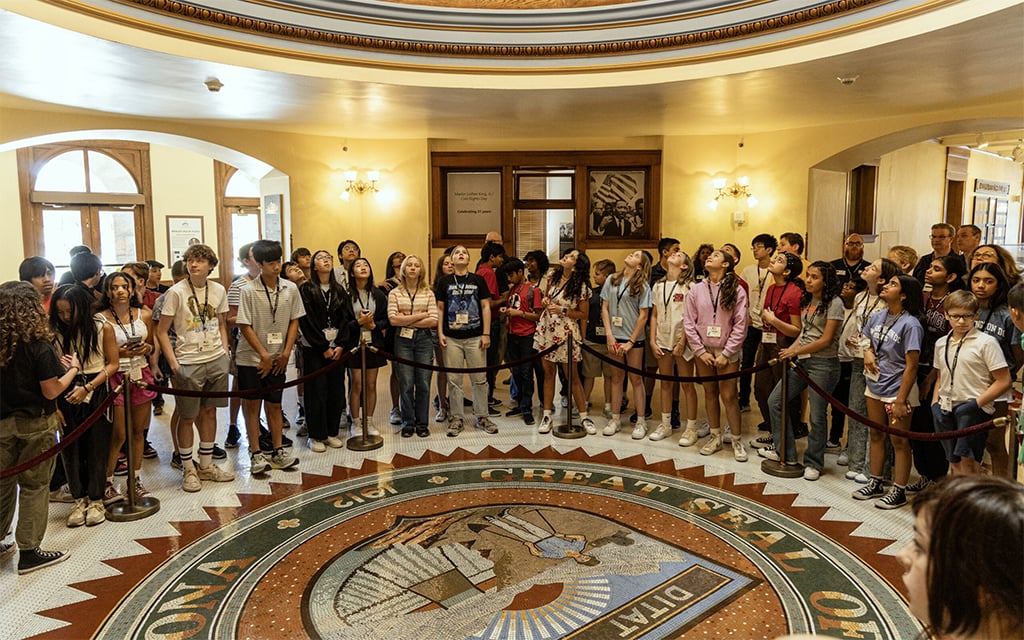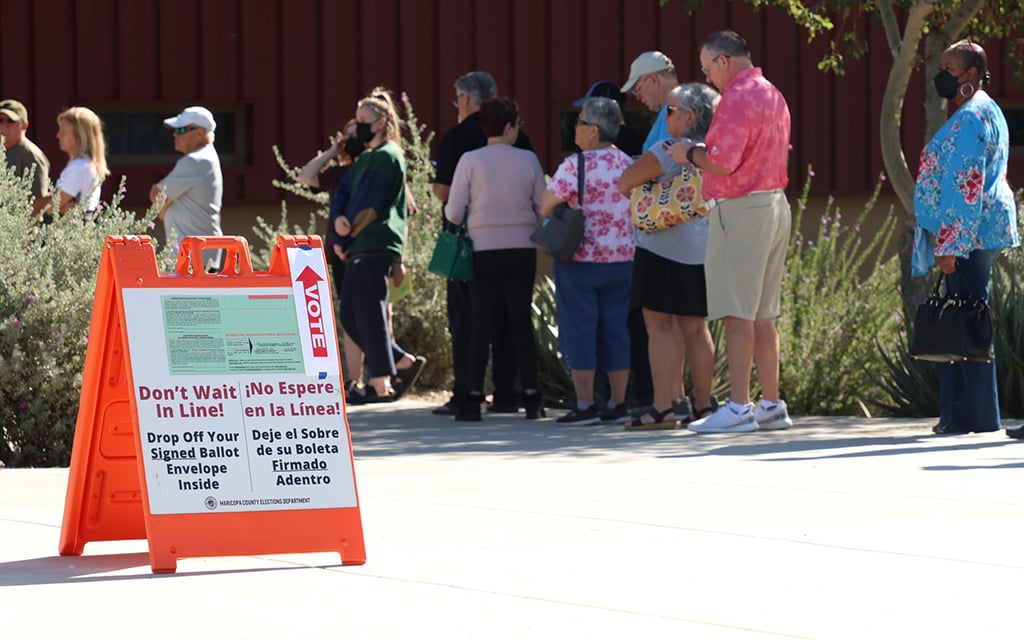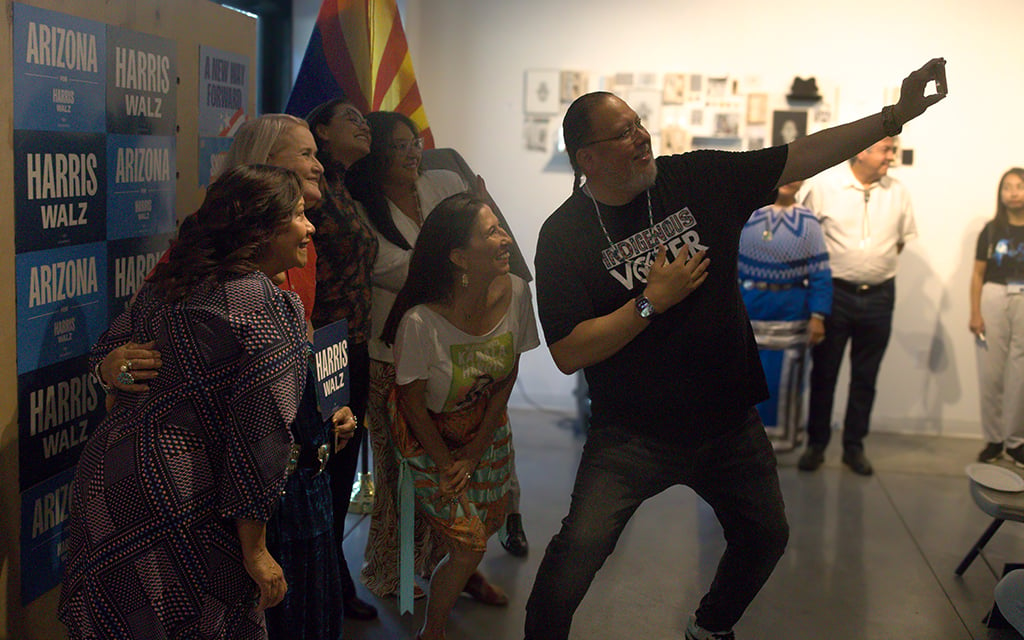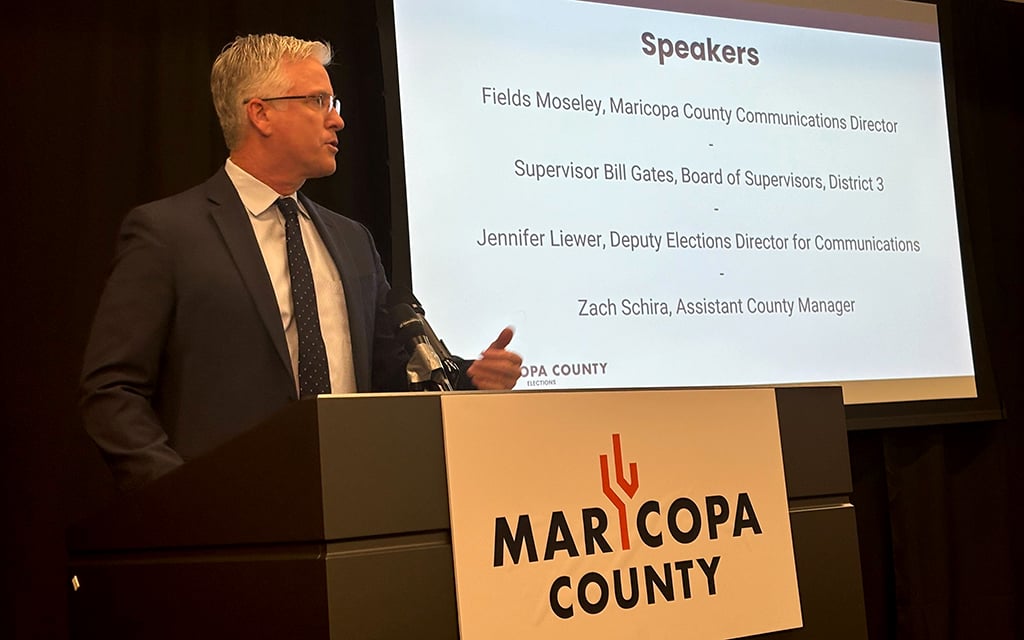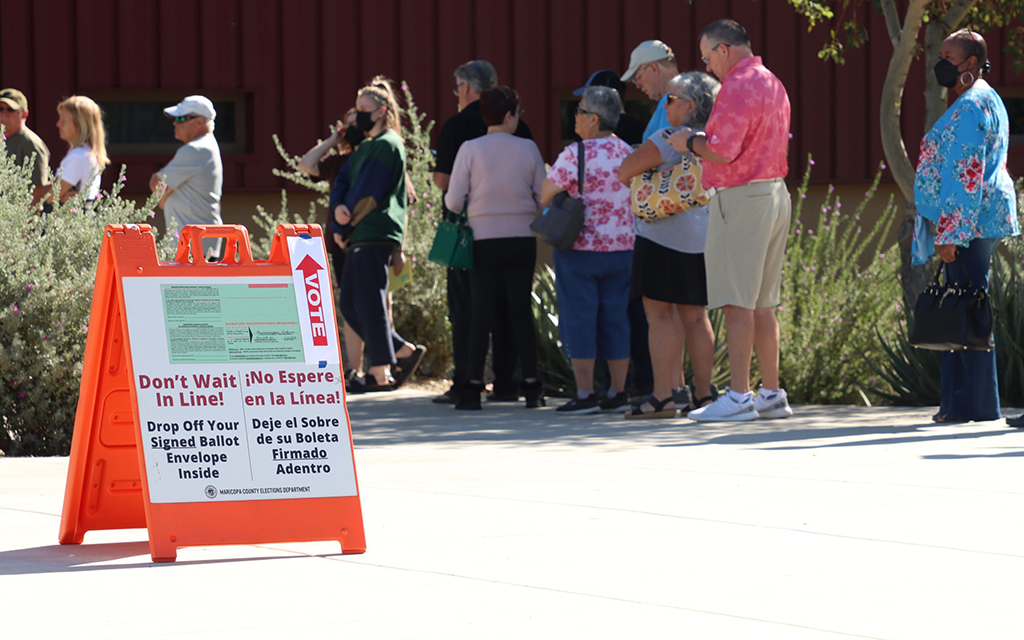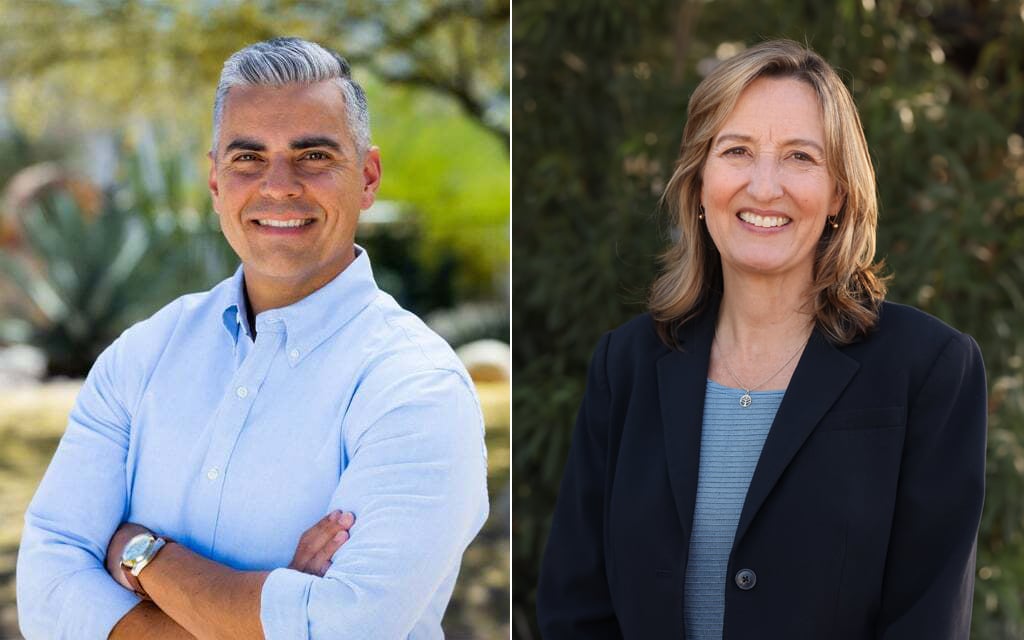
Left: Rep. Juan Ciscomani is seeking reelection. (Photo courtesy of the Juan Ciscomani campaign) Right: Kirsten Engel lost in 2022 to Ciscomani and is seeking a rematch in 2024. (Photo courtesy of Engel for Arizona campaign)
WASHINGTON – In the rematch between first-term U.S. Rep. Juan Ciscomani, R-Tucson, and former state Sen Kirsten Engel, D-Tucson, immigration and abortion rights are forefront issues.
Both call the other extreme, even as each claims to be a centrist eager to work with people across the aisle.
“Rep. Ciscomani and I agree that Congress has been run by extremists,” Engel said during a fiery 55-minute debate Tuesday night. “Where we disagree – I believe Mr. Ciscomani is part of that dysfunction. He has sided with extremists.”
Ciscomani portrayed his challenger as out of touch on kitchen-table issues and public safety.
“My opponent stands for increasing taxes, defunding the police and not accepting the border crisis,” he said.
Both parties are investing heavily in the race. Republicans hold a mere eight-seat edge in the U.S. House, so a swing of only a handful of districts in November could shift control. This is one of only two Arizona districts rated as a toss-up by the nonpartisan Cook Political Report.
Ciscomani beat Engel by about 5,200 votes out of 350,000 two years ago in the 6th Congressional District, which includes parts of Tucson and Cochise, Pima, Pinal, Graham and Greenlee counties in the southeast corner of the state.
Roughly a third of voters in the district identify as independents with the rest divided evenly between the two parties.
They both live in Tucson, but Engel lives in the part represented by Rep. Raúl Grijalva, D-Tucson. U.S. House members must be state residents. They don’t have to live in the district, though the incumbent jabbed his challenger about that.
“I’m not trying to convince you. I’m trying to convince my constituents,” Ciscomani said at one point during the debate. “You don’t live in the district, so you’re not one of our constituents.”
Of nine U.S. House members from Arizona, Ciscomani ranked as the most bipartisan by the Lugar Center and Georgetown University’s McCourt School of Public Policy. Only 23 Republicans in the House ranked higher.
That’s part of his appeal to voters, though it drew attacks in the GOP primary from challenger Kathleen Winn. She accused him of being too moderate, though in the general election, Engel paints him as not nearly moderate enough.
“To get anything done you have to work across the aisle and find common ground and what we’ll need to do in Congress as well,” Engel said in a recent interview with Cronkite News. She cited bipartisan measures she worked on in the Legislature on education and water conservation. “I’m proud of that. That was a priority for me.”
Her campaign launched WhoIsJuanCiscomani.com to spotlight his connection with the Patriot Academy, an organization that promotes biblical principles in government and would ban abortion and gay marriage. Ciscomani was on the group’s board but has distanced himself from its positions.
She reiterated the attack in Tuesday night’s debate. He brushed off the reference to the Patriot Academy. As for abortion, he said, “This is a state issue. … The Supreme Court agreed with that and put it back on the states.”
Ciscomani has attacked Engel as an extremist too.
A website he launched, MeetKirstenEngel.com, focuses on comments she made denying there’s a border crisis and voicing support for shifting funds from police to crisis intervention teams.
Ciscomani and his campaign ignored repeated interview requests by email, phone and direct message.
One point of contention is the border security bill that Arizona Sen. Kyrsten Sinema, an independent, crafted with Oklahoma Sen. James Lankford, a conservative Republican, and others.
Former President Donald Trump prodded allies in the Senate to tank the bill, which was seen as the toughest bipartisan border deal in decades. Democrats contend that he prefers crisis at the border over solutions to improve his prospects of winning.
“You rejected it because of President Trump telling you and your caucus to do so,” Engel said during Tuesday night’s debate.
Trump and Ciscomani have endorsed each other.
In the first debate with Engel in late August, Ciscomani said he disliked parts of the bill and would have opposed it without some changes. It never reached the House, and Tuesday night Ciscomani defended himself further: “Trump never called me. No one called me to tell me how to vote. I know how to do that by myself.”
One objection, Ciscomani said, was that the bill shut down asylum claims when the daily average of migrant encounters hit 5,000 – a threshold he believed was too high. In June, President Joe Biden used executive authority to set a 2,500 daily threshold.
“We need to implement ‘remain in Mexico,’ ” Ciscomani said Tuesday night, referring to a policy that keeps migrants outside the country until they receive a visa. “This big idea of a huge border package is going to find problems.”
Like other Republicans, Ciscomani demands an end to “catch and release” – the policy that allows asylum-seekers to remain in the U.S. as they await resolution of their case. And he would resume construction of the border wall, a top Trump priority.
Born 200 miles south of Tucson in Hermosillo, Mexico, Ciscomani came to the United States at age 11 with his family through a church sponsorship program, a background he highlights with voters.
His brother-in-law, Alexander Aviña, blasted him as an ”anti-migrant migrant” after he and other Republican lawmakers visited the border in January to criticize Biden.
Ciscomani has criticized Engel over comments from 2022 when she denied there was a crisis at the border.
Democrats have long demanded a comprehensive deal that combined security with a path to citizenship for people in the country illegally. They have largely backed away from that since crossings hit record levels under Biden.
Engel said she wants to secure the “border first and then fix our very broken immigration system.”
She has expressed support for hiring more border agents and immigration judges to process migrants more quickly and to expand the use of technology to prevent trafficking. She also wants to reform immigration laws and boost funding for shelters so authorities don’t release migrants into Arizona cities.
Engel has made support for reproductive rights a focus of her campaign.
Democrats are hoping for a surge in turnout to support Proposition 139, which would add abortion rights to the state constitution. State law currently bans abortion after 15 weeks of pregnancy except to protect the life of the pregnant person.
Engel sidestepped questions Tuesday night about whether she supports any limits on abortion rights, saying such decisions should be left to women and their doctors.
Ciscomani supports exceptions in cases of rape and incest, though critics noted that he celebrated the U.S. Supreme Court ruling in June 2022 that overturned Roe v. Wade.
He opposes a federal ban on abortion, though he has voted against coverage for military personnel, including travel reimbursement if they live in a state with a ban.
“Imagine that these are women that are fighting for our freedom and we can’t give them the freedom to make their own health care decisions,” Engel said during the debate. “Every woman, every person, has to have the freedom to make their own health care decisions with their doctor.”

